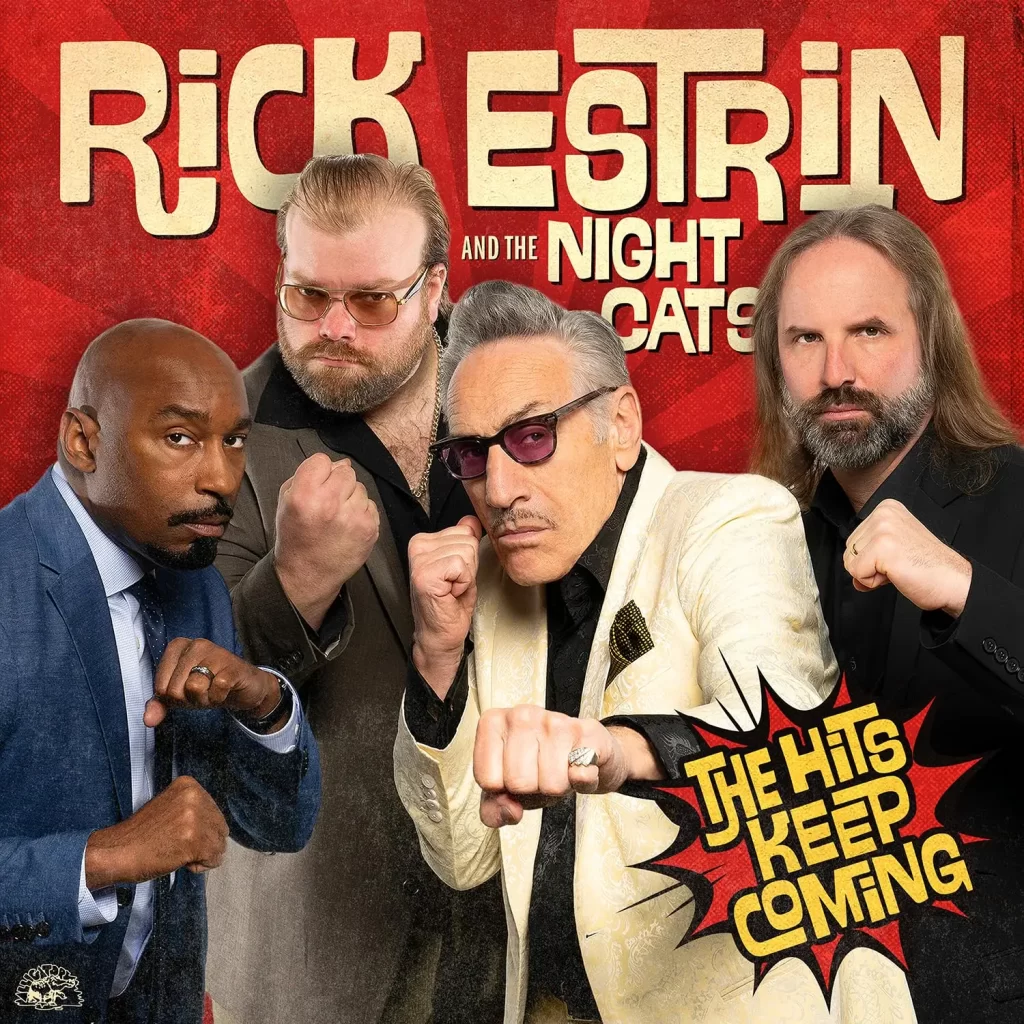“You gotta keep feeding the meter. Otherwise, you disappear.”
Rick Estrin is 73 years old. He started playing harp and singing the blues with seasoned veterans in the San Francisco Fillmore District ghetto when he was 12. I don’t use the term legacy cavalierly, but with the release of The Hits Keep Coming, his latest album with his band The Night Cats, Rick has earned the legacy moniker and then some. His backstory is full of more twists and turns than a pretzel, and this album is a shining showcase of a man who’s seen it all. While not for adults only, a full understanding of his lyrics is best grasped by those who have lived long lives with their eyes wide open and fueled by a love of the blues genre.

I began my interview with Rick by asking him if – knowing everything he’s learned in his life – he was able to go back to being a 12-year-old white kid hanging out on Market St. in San Francisco, what would be the first thing he’d tell himself back then.
“Oh, God. You know it’s really hard to say because everything turned out just perfect. I’ve been absurdly lucky, really, so it’s hard to say. I mean I made a lot of bad choices along the way. Music was the best choice I made. That saved my life. You know, I was a nut, man. I was a little volatile, and I was also a pretty fun-loving guy.
“Drugs were real popular at that time, and I was just a kid. I didn’t know any better. So, I did things that probably would not have been advisable and things that really turned out badly, and somehow I skated through all of that long enough to get hip to myself to do a little better.”
He sings about the monkey on his back in “The Circus Is Still in Town” on The Hits Keep Coming. The circus he’s talking about is life, and the monkey is his former drug habit. “That’s really what that song is all about. Other people are saying ‘Oh, the monkey ha, ha.’ You listened to the lyrics. You know what it’s about, and all that stuff is my story. So, those were some bad choices. That’s for sure.
“BUT! I also have to qualify it like starting out through luck and also fortuitous associations with other people who gave me a reason to want to survive and want to do better. All of those on the surface bad choices turned out to be character building experiences.”
Rick had two early influences in musical life, Fillmore Slim who was a pimp and a bad influence and Roger Collins best known for his hit “She’s Looking Good” who was a good influence.
“I met Roger Collins when I’d just turned 18, and I’d gotten my first professional gig. I was opening for ZZ Hill in a place called The Club Long Island in San Francisco, and I was like a novelty act on the bill, a white guy playing blues. I had met Fillmore Slim a couple of days prior to that, and I told him I had this gig and he should come down. So, he had Roger Collins with him, and Roger had a big hot record especially around the Bay Area. It was the number one record.
“I had too much respect for him to have the drug stuff around him. I never did that. He was so helpful to me. He took me around sometimes. He put me on shows with him opening the show sometimes. He just had me guard the dressing room, but most of the time, man, he would just come by my house, pick me up and we would just ride.
“He gave me a musical education and also an education of the music business and entertainment and why certain things are effective or not, the kind of things you should stay away from, that kind of thing you need to watch out for, and the kind of things that will work. Also, he tipped me to publishing, contracts, and all that stuff. A lot of that was things I wouldn’t have been able to make use of or implement until later on when I had developed my own thing, but he shared all the valuable information with me. I guess he liked me. and he could tell I was really interested. I mean, I paid attention to him. and we’re friends to this day.
“Another thing he taught me about was songwriting. He’s always thinking about a hit. So, he would just be sharing the things he was learning, and he had learned about it and play different things for me. He taught me how a song has to be consistent, and tense has to be consistent, and meter has to have a consistent twist to it, but it has to be something compelling. If you’re gonna borrow something from something you like, make sure it’s not detectable, which all songwriters do, but the best ones you can’t tell.”
Blues Renaissance man Dick Waterman once told this reporter that every dedicated bluesman has an entry into the blues, one record or encounter that hooked him or her for life. With Rick it was a Ray Charles album. “At 12 years old my sister gave me an album for my birthday. At that time, I think it was a new record called The Genius Sings The Blues, and I just got so absorbed in the record. I’m a little kid. I’m naïve, but I felt like, ‘Wow. This guy really understands how I feel’ which is laughable now, but that was my feeling at the time.”
Ray Charles was older, black and blind. Not very much like tweenaged Rick Estrin. “That just made it completely absurd, but that’s how I felt, you know? I had a lot of emotions I couldn’t understand. And my sister also was about six years older than me. She was also in San Francisco and was kinda like a high school beatnik. She had a lotta albums. She had a Jimmy Reed album. She had Big Bill Broonzy. She had Champion Jack Dupre’s Blues from The Gutter.”
Rick credits luck and discipline from more than 60 years playing – and living – that have gotten him to the point he’s at in his career. For decades, his band was known as Little Charlie and the Nightcats even though Charlie Baty played guitar and Rick was front and center as the singer. A lot of people thought Rick was Charlie.
“Oh, yeah. There’s a song on the record about that. The last song on the record called “Whatever Happened to Dobie Strange?” Check that out. I think that’s my favorite song on the record, but the reason why, he had the band for about six months before I was in it, and he was a semi control freak, and it really worked.
“In hindsight it actually worked to keep us together because early on in the band we were both young, and whatever. We’d butt heads and things like all people do, but in the back of my mind I’d be saying, ‘You know! If I quit, nobody will know who the hell I am.’ I’d be saying if we split up, people will be asking what happened to Charlie. So, it worked out. It kept us together through a contentious period, little flareups. For the last 20 years everything was pretty smooth, but early on we would butt heads sometimes.”
The Hits Keep Coming is a career-defining album of adult songs with references reflecting Rick’s long strange trip into the blues. Recorded for Alligator, the blues label that’s been in business almost as long as Rick has, it features Kid Andersen on guitar and was recorded at Kid’s Greaseland Studios. It’s a textbook example of originals that have one foot in traditional postwar Chicago blues and another in contemporary 21st century mainstream electric blues. This is Alligator’s wheelhouse, and Kid is a master guitarist ubiquitous to many of the best albums recorded in his studio. The combination is a perfect foil for Rick whose stage personality is a character with a capital C.
This reporter told Rick that I really enjoy the influence of Kid Andersen and the studio. He seems to bring out the best in everybody that gets involved with him and yet he never gets in their way, and they all have their own style and yet he seems to add so much.
“That’s 100% true, man. He understands all the different nuances of the different subgenres and different styles, and he understands all of that. He can sometimes re-envision something for you or also enhance it with the perfect thing that you think of, and he can play almost every instrument so he can add things. He will hear things and just add a little part that just sweetens the arrangements. That just puts it over the top.”
Rick is sanguine about his age. “You gotta keep on the cue. That’s one thing I notice about getting older is it’s important to stay mentally active and physically active because you go downhill quick, and I’m afraid to stop. People say, ‘How long are you gonna do this, man?’ Either until I can’t do it, or no one wants to see us ’cause I enjoy it and probably appreciate it more than ever.”

